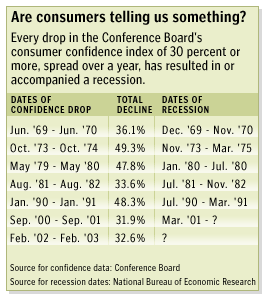NEW YORK (CNN/Money) - Harsh weather and worries about war dragged U.S. retail sales down in February, the government said Thursday, in a report that was much worse than analysts expected.
The Commerce Department said retail sales fell 1.6 percent to $304.1 billion after rising a revised 0.3 percent in January. Excluding sales of autos and auto parts, sales fell 1.0 percent after rising a revised 1.2 percent in January.
Economists, on average, expected retail sales to fall 0.4 percent and non-auto sales to fall 0.1 percent, according to a Reuters poll.

The decline in retail sales was the biggest since November 2001, and the drop in non-auto sales was the biggest since September 2001, the month that included the Sept. 11 terrorist attacks.
Economists expected that snowstorms in the eastern United States would drag retail sales down in the month, but the depth of the weakness indicated that concerns about a looming war with Iraq and a heightened terror alert status only made things worse.
"Once again, the retail sales report reveals that a war warning a day kept consumers away from the malls," said Anthony Chan, chief economist at Banc One Investment Advisors.
Separately, the Labor Department said new weekly claims for unemployment benefits fell to 420,000 in the week ended March 8 from a revised 435,000 the prior week. Economists, on average, expected 419,000 new claims, Reuters said.
The reports had little impact on U.S. stock prices, which posted strong gains in early trading on reports of positive developments in the situation in Iraq. Treasury bond prices fell.
Economists pay close attention to consumer spending, which makes up more than two-thirds of the total U.S. economy.
| Related stories
|

|
|
|
|
Consumers kept spending throughout a recession that began in March 2001 and likely ended near the beginning of 2002. They kept spending through the Sept. 11 attacks, a three-year bear market in stocks, news of corporate malfeasance and a host of other worries.
But consumer confidence has plunged recently to nine-year lows, dragged down by soaring oil and gasoline prices and a labor market that seems to be getting worse, raising concerns that another recession -- which has always followed such dramatic declines in consumer confidence and dramatic gains in oil prices -- could be on the way.
Most economists, however, hope that a quick resolution to the situation in Iraq will result in a swelling of confidence and a return to better economic growth.
"The hope is that as the war issue is resolved over the next couple of days rather than weeks, we may see another bounce back in consumer activity," Chan said.
The Commerce Department reported that much of the drop in non-auto retail sales in February was driven by a 7.5-percent decline in the sale of building materials -- a predictable development, with construction activity halted during February's snowstorms.
Sales at clothing and clothing accessory stores dropped 3.6 percent, furniture-store sales fell 1.6 percent, sales of electronics and appliances fell 0.5 percent, and sales at restaurants and bars fell 0.5 percent.
Auto sales fell 3.6 percent, while sales at gasoline stations rose 2.7 percent, mainly a function of the recent upward surge in gas prices.

|

